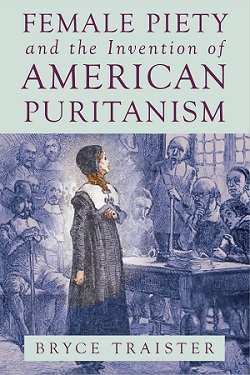Female Piety and the Invention of American PuritanismBryce TraisterLiterature, Religion, and Postsecular Studies |
 1/15/16 LITERARY CRITICISM / General LITERARY CRITICISM / American / General 248 pp. 6x9  $32.95 paperback 978-0-8142-5262-8 Add paperback to shopping cart $39.95 PDF eBook 978-0-8142-7400-2 Add PDF to shopping cart Shopping Cart Instructions Review/Change Shopping Cart & Check-out | |||
|
Explore More The Salem Witchcraft Papers (digital etext project at UVA) Online catalogue for the Society of Friends Library, London UK Webpage for the Society of Early Americanists Boston Public History Website, photo of Anne Hutchinson statue on Mass State House |
“Female Piety and the Invention of American Puritanism is a thought-provoking refocalization of Puritanism in an analytical orientation early Americanists too infrequently engage fully: the religious historico-genetics not just of American civic ideals but of the field of early American studies itself. This book will shift the conversation about secularism and religion in U.S. history and literature.” —Matt Cohen, University of Texas at Austin Female Piety and the Invention of American Puritanism reconsiders the standard critical view that women’s religious experiences were either silent consent or hostile response to mainstream Puritan institutions. In this groundbreaking new approach to American Puritanism, Bryce Traister asks how gendered understandings of authentic religious experience contributed to the development of seventeenth-century religious culture and to the “post-religious” historiography of Puritanism in secular modernity. He argues that women were neither marginal nor hostile to the theological and cultural ambitions of seventeenth-century New England religious culture and, indeed, that radicalized female piety was in certain key respects the driving force of New England Puritan culture. Uncovering the feminine interiority of New England Protestantism, Female Piety and the Invention of American Puritanism positions itself against prevalent historical arguments about the rise of secularism in the modern West. Traister demonstrates that female spirituality became a principal vehicle through which Puritan identity became both absorbed within and foundational for pre-national secular culture. Engaging broadly with debates about religion and secularization, national origins and transnational unsettlements, and gender and cultural authority, this is a foundational reconsideration both of American Puritanism itself and of “American Puritanism” as it has been understood in relation to secular modernity. Bryce Traister is Associate Professor, Chair of the English Department, and American Studies Centre Director of Undergraduate Studies at Western University in London, Ontario, Canada. | |||

